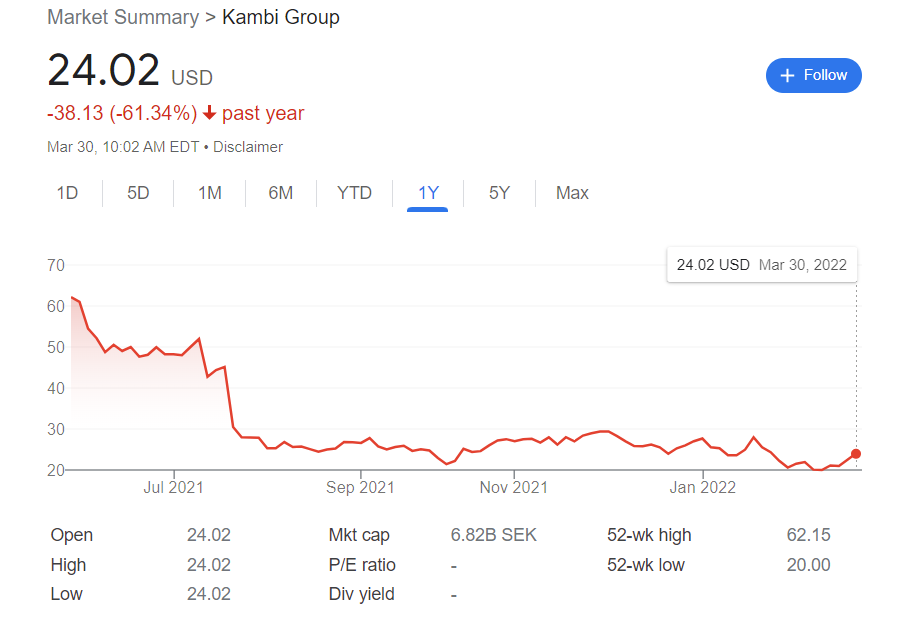In its recently released annual report, Kambi reported revenue of €162.4 million in 2021, a 38% year-over-year increase, while its operating profit grew by more than twice that amount, 77%.
These numbers stand in stark contrast to Kambi’s stock performance, which took a beating following the company’s loss of two sports betting partners – Mohegan Sun in July and Penn National in August. The loss of these partnerships seemed too much to bear for investors as Kambi’s stock continued to gain momentum after the DraftKings’ announcement that it had acquired SBTech in 2020 and would be migrating off the Kambi platform. DraftKings completed the migration in 2021.
The stock decline coincided with the two announcements from late July to early August. Kambi shares lost half their value over a couple of weeks.

Kambi’s stock has risen 11.5% in the last 30 days.
The B2B Sports Betting Landscape
Kambi’s performance vis-à-vis the perception of the company points to a possible disconnect within the industry concerning the B2B sports betting market. Kambi isn’t going to partner with the major operators (who are bringing everything in-house). Still, the partners Kambi has retained and the new partners it’s adding indicate the company’s important future in the US sports betting space.
In 2021, Kambi added eight partners. The company has already added two more partners in 2022:
- Affinity Interactive (2021)
- BetCity.nl (2021)
- Desert Diamond Casinos (2021)
- Island Luck (2021)
- NG Gaming (2021)
- Casino Magic (2021)
- Racing and Wagering Western Australia (2021)
- Saginaw Chippewa Gaming Enterprises (2021)
- MaximBet (2022)
- NorthStar Gaming (2022)
Current Partners
Kambi was already partnered with the Four Winds and Seneca tribes, indicating that tribes and regional commercial operators like Parx and Rush Street will drive Kambi’s B2B sports betting industry.
These partnerships aren’t as splashy as DraftKings or Barstool Sports. Still, Kambi provides tribes and local operators with a product capable of competing with the platform and tech the major national players can airdrop into any market.
And Kambi isn’t hiding its strategy, as the Annual Report states:
“Tribal casinos are an integral part of the overall gaming landscape in the United States. Over the last several decades since the passage of the Indian Gaming Regulatory Act of 1988, tribal gaming has grown into a substantial revenue making part of the industry and remains a significant area of focus for Kambi.”
It makes no sense for a tribal operator or local casino to invest in a high-level online sports betting platform. With Kambi, there’s no need to take that costly approach. Sports Betting Twitter is quick to take Kambi to the task. However, you’ll rarely see any of that criticism aimed at the tech or UX.
Kambi summed it up perfectly in the report, noting:
“As the regulated global sports betting market continues to expand, the high-cost implications of operating a sportsbook at scale in such a complex regulated environment further highlights the strengths of Kambi’s high performance technology.”
However you slice it, Kambi will play a level-the-playing-field role in the US. This will allow small operators to compete (on the tech side) with the major players.
Kiosks: The Forgotten Component
Kiosks are another core component of Kambi’s business. They are rapidly becoming a fixture in sports betting bills. States from Kansas to Massachusetts looking at expanding retail sports betting beyond casinos and into bars and restaurants, social clubs, and other entertainment venues.
While everyone hyper-focused on online platforms, Kambi also put significant time and energy into sports betting kiosks. That’s an investment that has paid off. Kambi currently has 1,167 kiosks, according to a Kambi spokesperson, who noted the number is constantly changing. The kiosks accounted for 83% of bets placed on the property in 2021, according to Kambi.
And as CEO Kristian Nylen told BettingUSA in June 2020:
“If I were to pick an area that exceeded our projections, I would look to the number of people we see coming through our kiosks. Pre-lockdown, approximately 80% of all on-property bets were placed at a kiosk, which in turn reduces the queues for the teller. Our partners have sought to make room for further kiosks in order to meet demand, underlining their importance and popularity. Along with our Bring Your Own Device technology, they have revolutionized the on-property experience.”
